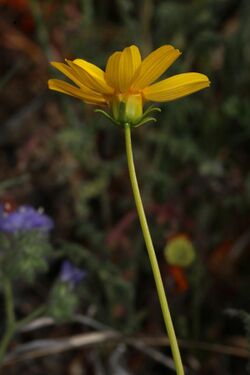Biology:Coreopsis bigelovii
| Coreopsis bigelovii | |
|---|---|

| |
| Scientific classification | |
| Kingdom: | Plantae |
| Clade: | Tracheophytes |
| Clade: | Angiosperms |
| Clade: | Eudicots |
| Clade: | Asterids |
| Order: | Asterales |
| Family: | Asteraceae |
| Genus: | Coreopsis |
| Species: | C. bigelovii
|
| Binomial name | |
| Coreopsis bigelovii (A. Gray) Voss [1]
| |
| Synonyms[2] | |
| |
Coreopsis bigelovii is a species of flowering plant in the daisy or sunflower family, Asteraceae, with the common names Bigelow coreopsis and Bigelow's tickseed.[3] It is endemic to California .[4]
The plant is known from the southern California Coast Ranges, southwestern Sierra Nevada, Transverse Ranges, and the Mojave and Colorado deserts. It is widespread in a number of habitat types from Merced and Inyo Counties south to San Diego County.[5][6][7]
Description
Coreopsis bigelovii is annual herb that produces one to many stems with erect, stemlike inflorescences 10 to 30 centimeters tall. The leaves are divided into narrow lobes which are sometimes subdivided, and most of the leaves are located at the base of the plant.[5][8]
The many inflorescences bear solitary flower heads, each with a bulbous involucre of rough phyllaries. The flower head has a center of many yellow disc florets and a fringe of five to ten ray florets up to 2.5 centimeters (1 inch) long.[5][8]
The fruit is a small achene. The fruit of the ray floret is rough and bumpy and lacks a pappus; that of the disc floret is more slender, shiny, edged with hairs, and tipped with a pappus of scales.[5][8]
Coreopsis bigelovii may be distinguished from Coreopsis calliopsidea by its linear outer phyllaries. Coreopsis calliopsidea has triangular to ovate outer phyllaries.[9] The outer phyllaries of Coreopsis californica are narrowly lanceolate and have yellow or red hairs at their base.[10]
Uses
This plant was eaten as a raw or cooked green vegetable by the native Kawaiisu and Tübatulabal peoples of California.[11]
References
- ↑ John L. Strother (2006). "Coreopsis Linnaeus, Sp. Pl. 2: 907. 1753; Gen. Pl. ed. 5, 388. 1754". in Flora of North America Editorial Committee. Magnoliophyta: Asteridae (in part): Asteraceae, part 3. Flora of North America. 21. Oxford University Press. pp. 185–198. http://www.efloras.org/florataxon.aspx?flora_id=1&taxon_id=250066416.
- ↑ The Plant List, Coreopsis bigelovii (A.Gray) H.M.Hall
- ↑ Mojave Desert Wildflowers, Pam MacKay, 2nd Ed., p. 206
- ↑ Biota of North America Program 2014 county distribution map
- ↑ 5.0 5.1 5.2 5.3 "Leptosyne bigelovii". Jepson Herbarium; University of California, Berkeley. 2018. http://ucjeps.berkeley.edu/cgi-bin/get_IJM.pl?tid=Leptosyne%20bigelovii. Retrieved 2018-07-06.
- ↑ Sullivan, Steven. K. (2018). "Leptosyne bigelovii". http://www.wildflowersearch.com/search?&PlantName=Leptosyne+bigelovii. Retrieved 2018-07-06.
- ↑ Calflora taxon report, University of California, Leptosyne bigelovii (A. Gray) A. Gray, Bigelow coreopsis
- ↑ 8.0 8.1 8.2 Flora of North America, Coreopsis bigelovii (A. Gray) Voss
- ↑ "Leptosyne calliopsidea". Jepson Herbarium; University of California, Berkeley. 2018. http://ucjeps.berkeley.edu/cgi-bin/get_IJM.pl?tid=Leptosyne%20calliopsidea. Retrieved 2018-07-06.
- ↑ "Leptosyne californica". Jepson Herbarium; University of California, Berkeley. 2018. http://ucjeps.berkeley.edu/cgi-bin/get_IJM.pl?tid=Leptosyne%20californica. Retrieved 2018-07-06.
- ↑ University of Michigan @ Dearborn, Native American Ethnobotany
External links
Wikidata ☰ Q303296 entry
 |



